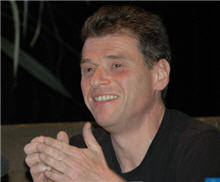Media literacy in a media saturated world

The question of what becomes of journalism in the age of mass media, in which anyone with an Internet connection can be their own publisher and reach a potential audience of billions with a single click was the subject of a conversation at a cybersalon hosted by Sylvia Paull near the UC Berkeley campus on Sunday.

Keen characterized his book, which is due out June 5, as a grenade and a polemic designed to stimulate discussion on the impact of placing the tools of creation, production and distribution in the hands of billions of people.
The panelists included Keen along with, Dan Gillmor, visiting professor at the UC Berkeley Graduate School of Journalism and author of " "="">; Katie Hafner, technology reporter for the New York Times and author of several books, including "Where Wizards Stay Up Late: The Origins Of The Internet"; and Robert Scoble, producer of scobleshow.com and coauthor of "Naked Conversations: How Blogs are Changing the Way Businesses Talk with Customers."
Keen decried the narcissism pervading new media in his diatribe against the amateurs. “There are two groups of people I wanted to annoy in the book, the libertarians on the left—the Dave Winer’s of the world, the computer culturalists who have found something to whine about, and the Republican libertarian, economic radicals like Chris Anderson [author of The Long Tail],” Keen said.
Winer gave his opinion of Keen's book in a February post: "There's no food for thought in this book. I was ready for a work that would inspire a thoughtful response, because I like Andrew, at a personal level, but this book is beneath criticism. Back to the drawing board."
Gillmor, whose work is cited in Keen’s book, said the book was “riddled with errors and a misrepresentation of things I know about.”
Keen apparently has hit some nerves, but the debate about the veracity of his book didn’t last long, with the conversation pivoting to the traditional media vs. new media debate. Is traditional media going to be chewed up and spit out by millions of bloggers, podcasters and videocasters, the self-absorbed monkeys typing on keyboards as Keen represents in his forthcoming book?
He went to say, “Whether we can make it through this very messy period with great journalism is a question, but I think we can. It will include things we directly pay for and indirectly pay for with advertising, and individuals and collectives at the edge of network will create value.”
Agreed. Traditional media is under great business pressure. The San Francisco Chronicle just announced a layoff of one quarter of its news staff. But bloggers are not summarily replacing traditional journalists as primary sources of news. Traditional journalists and media outlets are migrating to Web and new media journalists are hooking up with mainstream media.
The top stories on TechMeme on any given day include scoops from traditional media. For example, the top tech stories at midday on TechMeme on May 21 were from the Wall Street Journal, BBC, The New York Times and the Washington Post. Hafner talked about the benefit of working at a paper like the New York Times, which has the resources and support infrastructure to allow her and colleagues to work on time-consuming investigative scoops.
But new media startups, such as GigaOm, TechCrunch and VentureBeat are breaking stories, as well as the ‘older’ new media, such as News.com, ZDNet’s blog network, BusinessWeek blogs and Eric Savitz’s blog at Barrons, and media you have never heard of before.
A continuum of new and traditional media outlets have earned reputations as trusted, albeit imperfect, sources of information, and who are viewed as key outlets by vendors and information consumers. And, they have to earn their reputations every day.
Importantly, thousands of bloggers, podcasters and videocasters are refactoring primary sources and bringing new insights, expertise and fresh trails to follow via their contributions to the data pool. Democratization of media comes along with a lot of crap, but it also allows a more diverse set of authorities on any topic or subject matter to emerge.
What ultimately came out of the conversation was general agreement was that a more discerning and skeptical public is desirable in the age of mass media production and consumption. “Media literacy is a broad cultural issue…it’s about education and how you consume information,” said Keen. “That is the fundamental challenge we have to address. If we create new media that reflects the personalized consumer-centric culture and is easy simple and quick to consume, then media literacy won’t happen. It takes a lot of effort—there are no shortcuts.”
Keen is looking to parents, peer groups and educational systems to halt the slide in media literacy, to save the MySpace generation from a life of ignominy.
I’m not sure that’s the case, given that a major portion of the world’s population is more fixated on "American Idol" than on how to fix healthcare systems.
“There is a major need for what will amount to a whole new kind of media literacy in a media saturated world. We have to do it,” Gillmor said. “Everybody should have some skepticism but amount of skepticism depends on the source.”
Newstrust.net was pointed out as an experiment is a community, somewhat like Digg, recommending stories to each other as a way to assist readers in finding the more trusted sources.
Michael Goldhaber, who is known for his research on the attention economy, chimed in from the audience, said, “We all need BS detectors for anything we read.”
As Scott Rosenberg of Salon said, “We put it out there and get a better story over time.”
You can't legislate notions of media literacy or intellectual rigor, but more attention should be focused on educating children to be more careful readers and for social networking to include thinking about and acting upon what makes a good community.
See also: Scott Rosenberg's post on the cybersalon, Renee Blodgett's coverage of the event